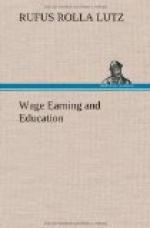XIX. The printing trades 195 The composing room 198 The pressroom 201 The bindery 203 Other occupations 204 The problem of training 206
LIST OF TABLES
Table
page 1. Occupational distribution
of the working population
of Cleveland
26
2. Nativity of the working population in Cleveland 27
3. Pupils enrolled in the different grades
of the public
day schools in
June, 1915 30
4. Enrollment of high school pupils, second
semester,
1914-15
31
5. Ages of pupils enrolled in public elementary,
high,
and normal schools
in June, 1915 33
6. Educational equipment of the children
who drop out
of the public
schools each year, as indicated by
the grades from
which they leave 35
7. Per cent of total male working population
engaged in
specified occupations,
1900 and 1910 40
8. Distribution of native born men between
the ages of
21 and 45 in the
principal occupational groups 41
9. Distribution of third and fourth year
students in
trade courses
in the Cleveland technical high
schools, first
semester, 1915-16 63
10. Distribution by occupations of Cleveland’s
technical
school graduates
64
11. Time allotment in the apprentice course given
by the
Warner and Swasey
Company, Cleveland 70
12. Course and number enrolled in the technical
night
schools, January,
1915 77
13. Per cent of total population engaged in gainful
occupations during
three different age periods 84
14. Number employed in the principal wage earning
occupations among
each 1,000 women from 16 to 21
years of age
85
15. Per cent of women employees over 18 years
of age
earning $12 a
week and over 120
16. Wages for full-time working week, women’s
clothing,
Cleveland, 1915
139
17. Average wages for full-time working week
for similar
workers, in men’s
and women’s clothing, Cleveland,
1915
139




